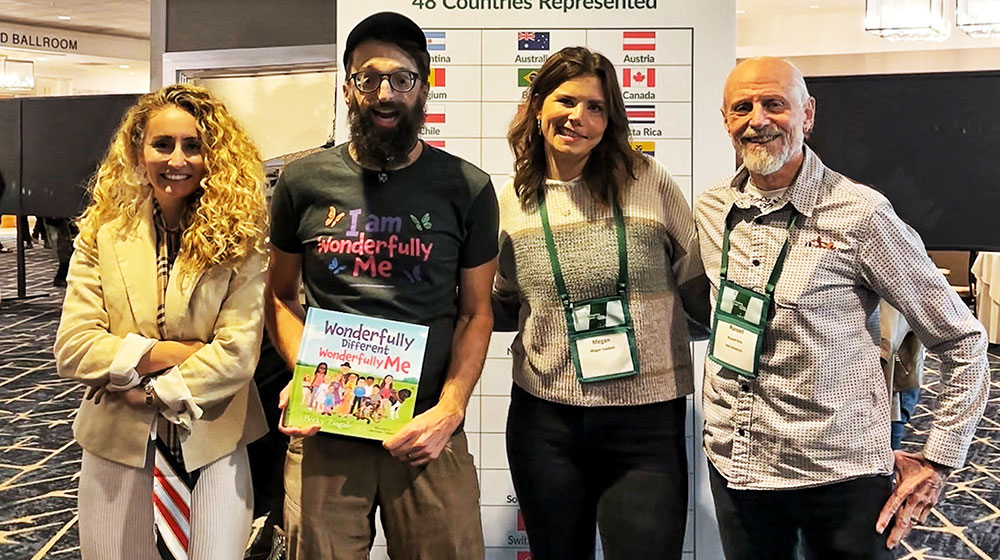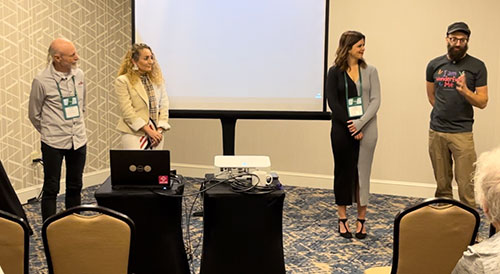Face Value: Focusing The Lens On Those With Facial Differences
 Pacific University Assistant Professor of Marketing Lena Cavusoglu has always been passionate about diversity, equity and inclusion issues.
Pacific University Assistant Professor of Marketing Lena Cavusoglu has always been passionate about diversity, equity and inclusion issues.
But her recent work into uncovering biases in marketing for those with facial differences is a little more personal.
Cavusoglu’s research interest has resulted in the creation of an award-winning short documentary chronicling the experiences of those with facial differences. Face Value, produced by Cavusoglu and Russell Belk, professor of marketing at York University in Toronto, won the Best Film Award at the 2023 Association for Consumer Research (ACR) Conference in Seattle.
The 15-minute documentary presents the experiences of 19 individuals from five continents with a range of facial differences. In their own words, the film’s co-creators, as Cavusoglu refers to the participants, discuss their experiences growing up with facial differences, the stigmas surrounding facial differences, and the challenges they face integrating into a society that favors a high standard of beauty.
Some of Face Value’s co-creators have large birthmarks on their face. Some experience facial paralysis. Another co-creator was born with Treacher Collins syndrome, a genetic disorder that affects the growth and development of the head. One was the survivor of an acid attack and received skin transplants to restore her lips.
Facial differences first reached Cavusoglu’s consciousness when her now-husband, Ahmet, was afflicted with Bell’s palsy. A sudden onset illness caused by a virus or stress, Bell’s palsy causes facial muscle weakness or paralysis, which is permanent in rare cases. Ahmet recovered from his bout of Bell’s palsy, but it made both him and Cavusoglu more conscious of identity and self-concept.
“I learned that approximately 10% of the population experiences facial differences,” Cavusoglu said. “It doesn’t have to be Bell’s palsy. It could be birthmarks, rare diseases that are genetic or congenital, or acquired differences that happen later in life. It could be someone who has survived an acid attack, a burn or an accident.”
While Face Value does not directly address marketing issues, it does address how those with facial differences are affected by societal norms shaped by marketing practices and how those stigmatized communities choose to reject the mainstream.
They are norms that Cavusoglu says has been perpetuated by the entertainment industry, often depicting the villain as someone with a facial difference. Think of the Phantom of the Opera, Scar from The Lion King, the Two-Face character from the Batman movies or “Weird Barbie” in the recent smash film Barbie. The typecasting of those characters, she says, makes society believe that those with facial differences are ugly or evil.
“People with facial differences are always represented as the villain in Hollywood movies. If you think about it, it is always the bad character that is going to do some kind of harm,” Cavusoglu said. “Their life becomes more challenging because of this ingrained norm that what is beautiful is good and what is considered ugly is bad.”
 To amplify the impact of Face Value, Cavusoglu and Belk were joined by two of their co-creators, Megan Gaydosh and Duane Zingale, at the ACR conference to conduct a question-and-answer session following the film’s premiere. Such a session with the subjects of research is almost unheard of in marketing studies, but Cavusoglu believed it was important to amplify their experiences.
To amplify the impact of Face Value, Cavusoglu and Belk were joined by two of their co-creators, Megan Gaydosh and Duane Zingale, at the ACR conference to conduct a question-and-answer session following the film’s premiere. Such a session with the subjects of research is almost unheard of in marketing studies, but Cavusoglu believed it was important to amplify their experiences.
“We usually promise confidentiality and anonymity for our participants. In this case, this was probably the first time that the audience saw the research participants at the conference presenting with the researchers,” Cavusoglu said. “We had a great attendance and the audience was moved. They truly appreciated it.”
The experience of creating Face Value has changed academic priorities for Cavusoglu, who teaches in Pacific’s College of Business. She continues to be involved with researching diversity, equity and inclusion in marketing, but accessibility for those with facial differences has become a much larger part of her academic journey.
Cavusoglu and Belk continue to present Face Value and their research to classes and conferences all over the world. The film was presented as a keynote at the Anti-Consumption Research Conference in December 2023 in Australia and will be featured at April’s Consumption & Disability Conference in Belfast, Northern Ireland, and at July’s ACR Asia-Pacific Conference in Indonesia.
The duo, together with University of Southern California Marketing Professor Robert Kozinets, are furthering work on a related research project that investigates the consumer patterns of those who purchased a Barbie Fashionistas doll that has vitiligo, a chronic skin disease. The doll was produced by Mattel as part of a series featuring Barbies with a range of disabilities and visual differences.
As her research moves forward, Cavusoglu’s highest truth is to bring more awareness to the plight of those who live life with facial differences and the challenges they face.
“Even a 1% positive societal change in the perception towards facially different people would be a success,” she said. “If they just treat the facially different community in a way that they treat other people in their circle, that would be a plus on my end.”


